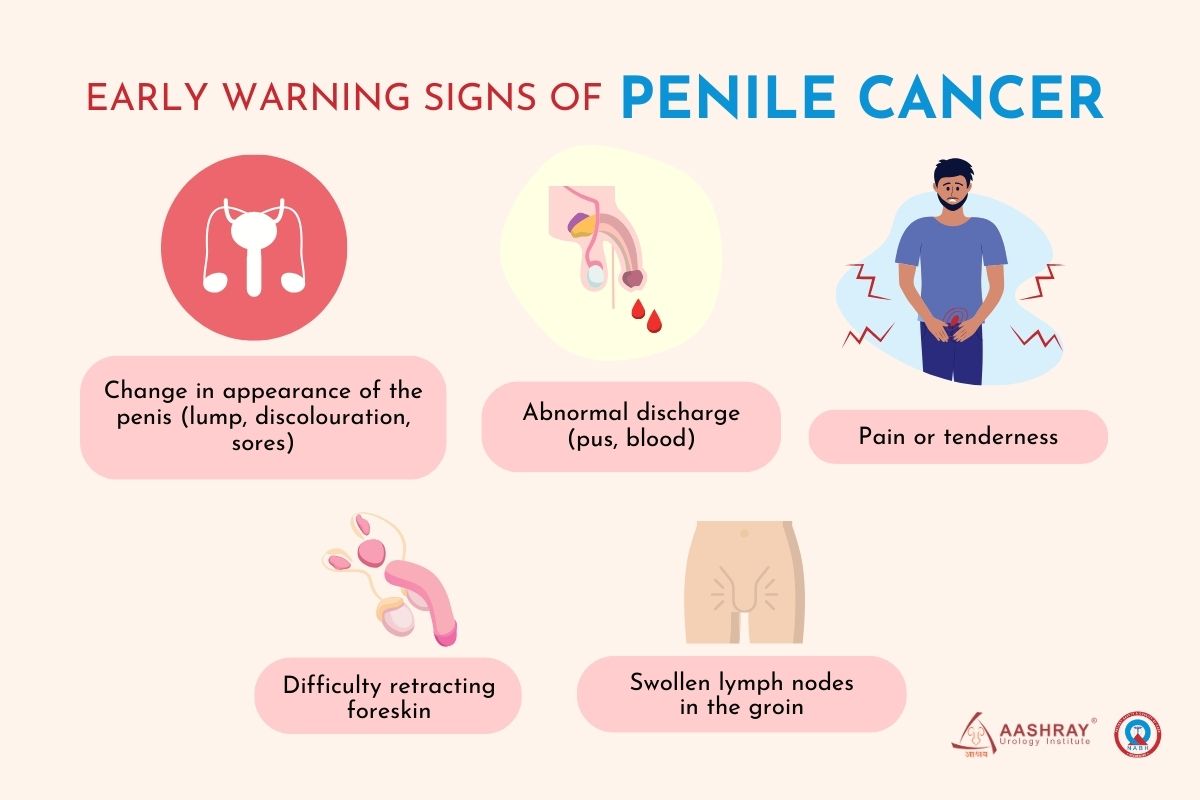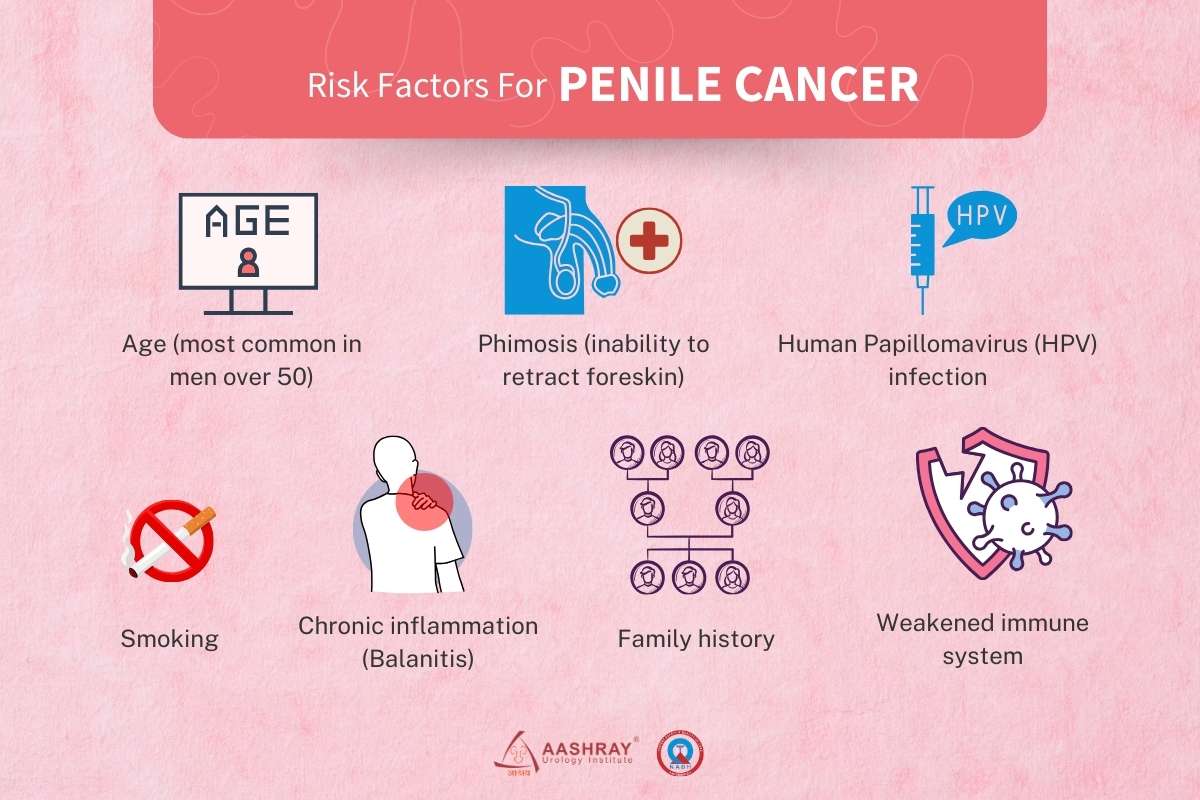According to NIH, one of the countries with the highest incidence of penile cancer in the world is India, with rates up to 3.32 per 100,000 men in some regions. Isn’t it alarming?
If yes, then let us discuss more about it today. This blog will help you to know more about penile cancer, the risks of penile cancer, treatment options and many more things.
In a world where health awareness is on the rise, understanding the importance of early detection is paramount. Through this blog, Dr. Ashit Shah delves into the specifics of penile cancer screening.
What Is Penile Cancer?
Penile cancer, although relatively rare compared to other cancers, demands attention due to its potential severity. This type of cancer originates in the tissues of the penis.
The rarity of penile cancer emphasizes the need for heightened awareness and education about the disease. By understanding its nature, we empower ourselves to take proactive steps towards prevention and early detection.
What Are The Symptoms Of Penile Cancer?
Symptoms of penile cancer include changes in the appearance of the penis, pus, pain and swollen lymph nodes in the groin.

Who Is Most Likely To Get Penile Cancer? (Risk Factors)
Several factors contribute to the development of penile cancer. Human papillomavirus (HPV) infection, smoking, poor hygiene, and a condition known as phimosis are among the recognized risk factors.
HPV, in particular, has been linked to various cancers, including penile cancer. It is essential to recognize how these factors play a role in the onset of the disease to address the root causes effectively.
Who Should Be Especially Vigilant? Understanding High-Risk Categories

In the realm of penile cancer prevention and early detection, certain groups of individuals should maintain heightened vigilance due to increased risk factors. By identifying these high-risk categories, we can empower specific populations to proactively manage their health. Here's a closer look at who should be especially vigilant:
Uncircumcised Men:
Uncircumcised men face a slightly higher risk of developing penile cancer compared to their circumcised counterparts. The foreskin can sometimes harbour substances that may contribute to the development of the disease. Regular Preputial hygiene and self-examination along with open communication with healthcare providers are crucial for uncircumcised individuals.
Men with a History of the Above Risk Factors:
Individuals with a history of known risk factors, such as human papillomavirus (HPV) infection, smoking, poor hygiene, or phimosis, should maintain heightened vigilance. Awareness of one's medical history empowers individuals to take proactive measures, including regular check-ups and screenings.
Male partner of women with HPV Infection and cervical Intraepithelial neoplasia have an increased risk of developing carcinoma.
Sexually Active Men with Multiple Partners:
Engaging in sexual activity with multiple partners increases the risk of exposure to various potential risk factors, including sexually transmitted infections. Sexually active men with multiple partners should prioritize routine sexual health check-ups and be vigilant for any unusual symptoms.
Smokers:
Smoking is a well-established risk factor for penile cancer. The harmful chemicals in tobacco can contribute to the development of cancerous cells. Men who smoke should be especially vigilant, recognising the importance of both quitting smoking and regular screenings to monitor their health.
Men with Compromised Immune Systems:
Individuals with compromised immune systems, whether due to medical conditions or medications, may be more susceptible to various health issues, including penile cancer. These individuals should work closely with healthcare professionals to manage their overall health, including routine screenings for penile cancer.
Men with Balanitis Xerotica Obliterans (BXO) :
Men with BXO have relatively more chance to develop penile cancer.
Navigate Penile Cancer with Confidence.
Expert guidance and unwavering support - from diagnosis to recovery
Why Vigilance Matters?
Early Detection and Intervention:
Being especially vigilant allows individuals in high-risk categories to detect potential issues early. Early detection facilitates timely medical intervention, which is crucial for better treatment outcomes. Early detection can lead to high success rates.
Tailored Health Management:
Vigilance enables individuals to adopt a proactive approach to their health. It allows for personalized health management plans that may include more frequent screenings and targeted interventions based on individual risk factors.
Preventive Measures:
Vigilance is the first line of defence in preventing the development or progression of penile cancer. By staying aware of potential risks, individuals can make informed decisions about lifestyle choices and preventive measures.
How Can You Reduce The Risk Of Penile Cancer?
Regular Check-ups:
Schedule regular check-ups with healthcare providers to monitor overall health and discuss any concerns related to penile cancer.
Screenings and Examinations:
Follow recommended screening guidelines, which may include physical examinations and other diagnostic tests based on individual risk factors.
Quit Smoking:
If applicable, individuals who smoke should consider quitting to reduce the risk of penile cancer and improve overall health.
Safe Sexual Practices:
Practice safe sex and maintain open communication with sexual partners about sexual health. This includes discussions about potential risk factors and regular screenings.
Health Monitoring:
Individuals with compromised immune systems should work closely with healthcare professionals to monitor and manage their health.
Importance Of Regular Check-Ups:
Regular medical check-ups are pivotal in maintaining overall health, including sexual health. Open communication with healthcare providers about any concerns or symptoms is key. Men are encouraged to prioritize routine check-ups, fostering an environment where discussions about sexual health are not only welcomed but actively promoted.
Screening Methods:
Screening for penile cancer may involve various methods, including physical examinations and biopsies. Early detection through screening enables less invasive treatment options, underscoring the importance of regular screenings. By familiarizing oneself with available screening methods, individuals can actively participate in their health and well-being.
What Are The Common Myths Associated With Penile Cancer?
Pain and Discomfort:
Myth:Screening for penile cancer is painful and uncomfortable.
Clarification: While certain examinations may cause mild discomfort, they are generally quick and tolerable. Open communication with healthcare providers is essential to address any concerns promptly.
Effectiveness of Screening:
Myth: Screening for penile cancer is not effective or necessary.
Clarification: Research consistently supports the effectiveness of early detection through screening. Early intervention significantly improves treatment outcomes and may reduce the need for extensive interventions.
Routine Check-ups as Preventive Care:
Myth: If there are no symptoms, there's no need for routine check-ups.
Clarification: Routine check-ups are a cornerstone of preventive care. Detecting potential issues before symptoms appear allows for early intervention, positively impacting the treatment process.
The importance of being vigilant about one's sexual health cannot be overstated. By understanding the risk factors, considering screening, and dispelling myths, individuals can actively contribute to their well-being.
Share this information with friends and family, contributing to the broader goal of increasing awareness about penile cancer. Remember, knowledge is power, and in the case of penile cancer, it can be a life-saving tool. Stay informed, stay vigilant.
Penile Cancer FAQs: Your Questions Answered
Is penile cancer painful?
Not necessarily. Pain isn't always an early symptom, making regular self-examinations and prompt follow-up on any abnormalities crucial. Early detection saves lives, so don't ignore changes in your penis, like lumps, discolouration, or sores.
Can penile cancer be prevented?
While no guaranteed prevention exists, proactive measures can significantly reduce the risk:
- HPV vaccination: Vaccinate against Human Papillomavirus (HPV), a major risk factor.
- Safe sex practices: Use condoms consistently to minimize exposure to potential risk factors.
- Good hygiene: Regularly clean your penis and foreskin to reduce irritation.
- Quit smoking: Smoking increases the risk of multiple cancers, including penile cancer.
What are the treatment options for penile cancer treatment?
Option of Penile Cancer treatment depends on stage of cancer-Surgery ,Radiation Therapy , Chemotherapy , or a Combination.
What are the latest advancements in penile cancer research and treatment?
Research is constantly evolving, exploring new and improved treatment options:
- Minimally invasive techniques: Advancements in laser ablation and other minimally invasive procedures offer the potential for better preservation of function and shorter recovery times.
- Targeted therapies: Research on therapies targeting specific genetic mutations in cancer cells holds promise for personalized and more effective treatment approaches.
- Immunotherapy: This exciting field explores the use of the body's immune system to fight cancer, offering the potential for new treatment options in the future.
While these advancements are promising, they are still under investigation. Stay informed about ongoing research to remain updated on the latest developments in penile cancer treatment.
Early detection is key to successful treatment. Consult a healthcare professional like Dr. Ashit Shah if you have any concerns.





